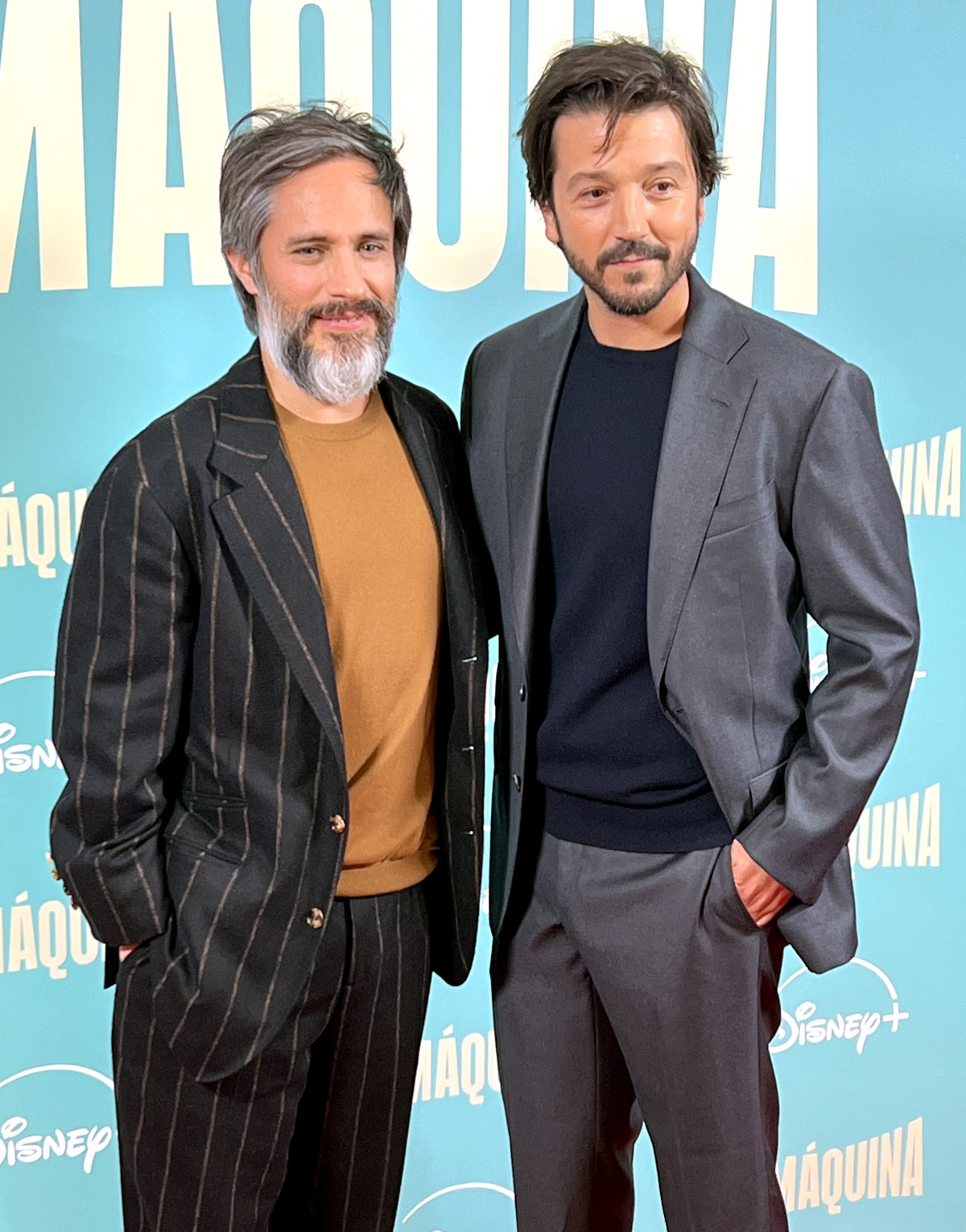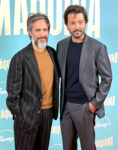
I feel like Gael García Bernal is one of those actors who is always working yet because he minds his own business, we know almost nothing about him. For example, I had no idea that he’s been acting since he was 11 years old or that he’s married with three children. Gael’s latest project is a limited Hulu series called La Máquina, which co-stars Diego Luna and Eiza González. He recently sat down with NPR’s Rachel Martin for an interview on The Wild Card podcast. During the interview, they talked about his feelings on getting older, on how acting was always his calling, and when he’s the best version of himself. What’s really intriguing, though, are Gael’s thoughts on death and transcendence.
On growing up in the theater: I grew up in the theater with my parents. It felt like when I was a kid, theater and life were very intertwined. The stage was just a step away. So in a way, I realized growing up that I was born into something special — into a world that is very unique. And the more I grew up, the more I saw the difference. There was the outside and there was inside. There was my home and there was the world. And there was a big moment in my adolescence that I didn’t want to be an actor.
He tried not to be an actor: I was completely and absolutely reluctant to do it because that’s where I was born in a way. That’s the place that was handy for me. So I wanted the challenge of something else. And I had other curiosities with archeology or sociology or anthropology, philosophy, and I studied philosophy in the Mexican National Autonomous University. And so I tried my best to not become an actor. And it was impossible to escape it.
He’s the best version of himself when he’s acting: For me, it isn’t the acting, it isn’t being on stage. It is the smell of the place. It is like a temple kind of thing. It is the place where I know that everything will be OK. There is this moment of incredible tension and excitement before going on stage, you know, before appearing. And then when you’re there, everything is amazing. Everything is just incredible. So I think I’m the best version of myself because, first of all, I don’t know who I am. So I guess the best of myself, kind of — not shines through, but that’s what we see in an actor when we look at their performances, we know they are someone else.
What he’s found surprising about getting older: Now I know how to do things better, but my body’s not responding as it used to, no? So, for example, with football — I play a lot of football and I just gave up because now it hurts. And I get hurt. But I think I play better than ever because now I know where to [go and] what position to be in.
How his feelings of death have changed over time: It’s changed a lot. Definitely. I guess the first time for me, and must have been for many, many people as well, is becoming a father, no? Like, for example, somebody the other day was telling me, like, “Does anyone remember the name of the grandfather of your grandfather?” And I was like, “No. I don’t think no one remembers that I know.” Like, wow, it’s crazy how all these things that we’re going to build and all these structures that we fight for or try to achieve…
He wants to leave a legacy: And so therefore, you see that transcendence is something else, no? And definitely with a baby transcendence is there, no? There is something that is there and will continue and will live and will reproduce and will be something else and you will just admire. But it is similar to what we do in films, as well. I mean my approach to doing films — and it might sound a little bit presumptuous — but it’s like trying to do something that hopefully has some transcendence. You really want these films to kind of transcend and hopefully be seen in many, many years, because that’s who we were at that point.
“Nothing ends. Everything transforms”: I love the mystery and the poetic behind all of it — but not as a believer. Mostly like that kind of enjoyment or curiosity. Nothing ends. Everything transforms. And that’s a law of physics. And I can feel it. I mean, there are so many examples I can say, some of them are incredibly personal. But when we knew that my daughter was — that we were pregnant, my father passed away. So it was that kind of, like, tag team (laughs). Yeah.
It sounds like Gael has given all of these topics a lot of thought, especially how he believes that he was destined to be an actor and his thoughts about death. I could have those types of philosophical conversations all day because the topic fascinates me. I agree with him, though. On both a spiritual and physics level, I think that all of our energy gets transferred into something else when we pass. His example of losing his father while his wife was pregnant with his daughter is similar to something my family has experienced, too. What Gael says about building things for future generations to appreciate even after your name is forgotten reminds me of Hamilton lyric, “It’s planting seeds in a garden you never get to see.” I always found that such a poignant way of looking at life and why we do the things we do now so that future generations can build off of it and are better for it.
Photos credit: CelebrityPhotosUK/Cover Images, Getty and via Instagram













“that he’s married with three children”
I don’t believe he’s married? He never married the mother of his first two kids but maybe he married the mother of the newest kid? Never heard a thing about it.
I think he and Diego have both learned to keep things locked down (the Spanish language gossip press is pretty brutal!). For instance I am pretty sure Diego and Marina de Tavira broke up, but I’m not sure!
I believe this with all my heart, that we just take on a different form of energy when we die. It reminds me of this eulogy that Aaron Freeman wrote:
“You want a physicist to speak at your funeral. You want the physicist to talk to your grieving family about the conservation of energy, so they will understand that your energy has not died. You want the physicist to remind your sobbing mother about the first law of thermodynamics; that no energy gets created in the universe, and none is destroyed. You want your mother to know that all your energy, every vibration, every Btu of heat, every wave of every particle that was her beloved child remains with her in this world. You want the physicist to tell your weeping father that amid energies of the cosmos, you gave as good as you got.
And at one point you’d hope that the physicist would step down from the pulpit and walk to your brokenhearted spouse there in the pew and tell him that all the photons that ever bounced off your face, all the particles whose paths were interrupted by your smile, by the touch of your hair, hundreds of trillions of particles, have raced off like children, their ways forever changed by you. And as your widow rocks in the arms of a loving family, may the physicist let her know that all the photons that bounced from you were gathered in the particle detectors that are her eyes, that those photons created within her constellations of electromagnetically charged neurons whose energy will go on forever.
And the physicist will remind the congregation of how much of all our energy is given off as heat. There may be a few fanning themselves with their programs as he says it. And he will tell them that the warmth that flowed through you in life is still here, still part of all that we are, even as we who mourn continue the heat of our own lives.
And you’ll want the physicist to explain to those who loved you that they need not have faith; indeed, they should not have faith. Let them know that they can measure, that scientists have measured precisely the conservation of energy and found it accurate, verifiable and consistent across space and time. You can hope your family will examine the evidence and satisfy themselves that the science is sound and that they’ll be comforted to know your energy’s still around. According to the law of the conservation of energy, not a bit of you is gone; you’re just less orderly. Amen.”
I love this, it perfectly encapsulates how I feel. Thank you for sharing.
Yes. Aside from heat, that energy is going to feed the saprophytes that decompose the body.
Sorry I am just catching up on comments now! I love this so much! Thank you for sharing!!
LOVE Gael. He’s surprisingly spiritual! Beautiful.